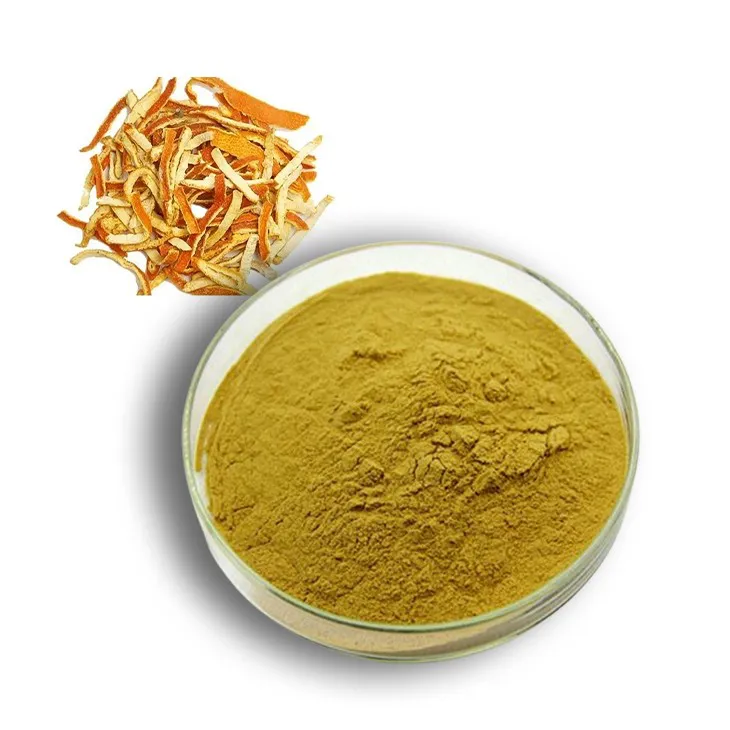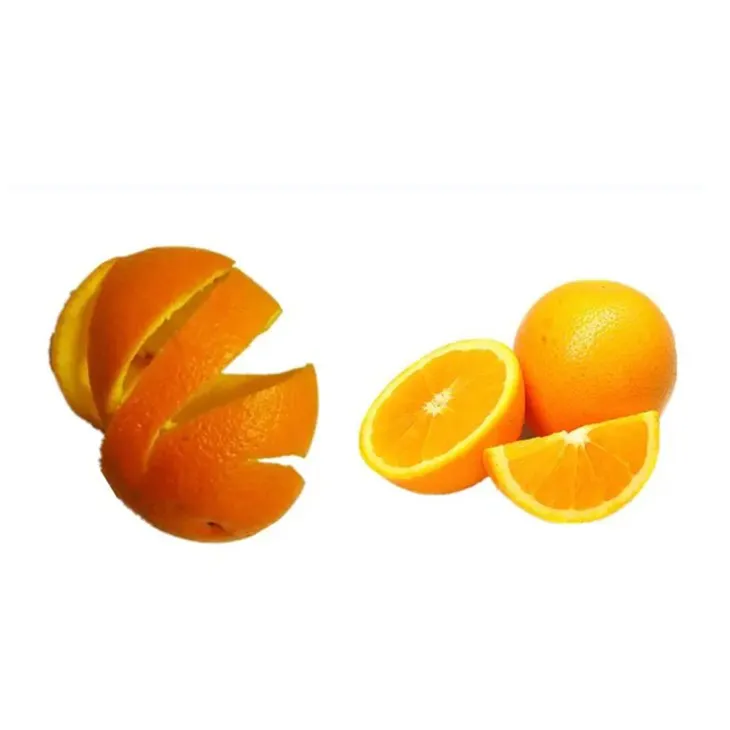- 0086-571-85302990
- sales@greenskybio.com
All the benefits of hesperidin.
2024-11-13

1. Anti - allergy Benefits
Hesperidin, the orange peel glycoside, is known for its remarkable anti - allergy properties. Allergies are the result of an over - reactive immune response in the body. Hesperidin can modulate this immune response related to allergies, thereby reducing a variety of symptoms.
For instance, symptoms like sneezing, which is an involuntary expulsion of air from the nose often triggered by allergens in the nasal passages. Itching, whether it be on the skin or in the eyes, can be extremely uncomfortable for allergy sufferers. And rashes, which are visible signs of an allergic reaction on the skin, can range from mild redness to more severe eruptions. Hesperidin helps in alleviating these symptoms by interfering with the complex immune mechanisms involved in allergic reactions.

2. Effects on the Nervous System
The impact of hesperidin on the nervous system is another area of great interest.
2.1 Calming Effect
Hesperidin has a calming effect on the nervous system. In today's fast - paced world, stress and anxiety have become common problems. These can disrupt the normal functioning of the body and mind. Hesperidin can help to relieve stress and anxiety by acting on certain receptors or neurotransmitter systems in the brain.
2.2 Sleep Improvement
As a result of its calming effect, hesperidin can also improve the quality of sleep. A good night's sleep is essential for overall health and well - being. It allows the body to rest, repair, and rejuvenate. By reducing stress and anxiety levels, hesperidin can contribute to a more restful sleep, helping individuals wake up feeling refreshed and energized.

3. Enhancement of Nutrient Bioavailability
Hesperidin plays a crucial role in enhancing the bioavailability of other nutrients.
- It helps the body better absorb vitamins. Vitamins are essential for various physiological functions in the body, such as maintaining healthy skin, eyes, and a strong immune system. However, the body may not always be able to fully absorb vitamins from the diet. Hesperidin can improve this absorption process, ensuring that the body gets the maximum benefit from the vitamins consumed.
- Similarly, when it comes to minerals, hesperidin can enhance their absorption as well. Minerals like calcium, iron, and zinc are important for bone health, oxygen transport, and enzyme function respectively. By increasing the bioavailability of these minerals, hesperidin helps in maintaining optimal health.

4. Liver Protection
Hesperidin shows great promise in protecting the liver.
4.1 Reduction of Liver Inflammation
One of the ways it protects the liver is by reducing liver inflammation. Inflammation in the liver can be caused by various factors such as viral infections, excessive alcohol consumption, or exposure to toxins. Chronic liver inflammation can lead to more serious liver diseases such as cirrhosis and liver cancer. Hesperidin can help to reduce this inflammation, thereby protecting the liver from further damage.
4.2 Promotion of Liver Cell Regeneration
In addition to reducing inflammation, hesperidin also promotes liver cell regeneration. The liver has a remarkable ability to regenerate itself, but this process can be impaired in the presence of certain diseases or toxins. Hesperidin can stimulate the regeneration of liver cells, helping the liver to recover from damage more quickly.

5. Cardiovascular Benefits
Hesperidin also offers several benefits for the cardiovascular system.
5.1 Blood Pressure Regulation
It can play a role in blood pressure regulation. High blood pressure is a major risk factor for heart disease and stroke. Hesperidin may help to lower blood pressure by relaxing the blood vessels, allowing blood to flow more smoothly through the arteries.
5.2 Cholesterol Management
Another aspect of its cardiovascular benefits is in cholesterol management. It can help to reduce levels of "bad" cholesterol (LDL - cholesterol) in the blood while increasing levels of "good" cholesterol (HDL - cholesterol). This helps to maintain a healthy lipid profile, reducing the risk of atherosclerosis and other cardiovascular diseases.
6. Anti - inflammatory Properties
Beyond its role in liver protection, hesperidin has broader anti - inflammatory properties.
Throughout the body, inflammation can occur in various tissues and organs due to injury, infection, or autoimmune disorders. Hesperidin can act as a natural anti - inflammatory agent, suppressing the production of inflammatory mediators such as cytokines and prostaglandins. This can help to reduce pain, swelling, and redness associated with inflammation in different parts of the body.
7. Antioxidant Activity
Hesperidin exhibits significant antioxidant activity.
Antioxidants are substances that can neutralize free radicals in the body. Free radicals are unstable molecules that can cause damage to cells, DNA, and proteins. This damage can lead to various diseases, including cancer, heart disease, and neurodegenerative disorders. Hesperidin can scavenge free radicals, protecting the body's cells from oxidative damage and reducing the risk of developing these diseases.
8. Potential in Diabetes Management
Hesperidin may also have potential in diabetes management.
8.1 Blood Glucose Control
It can help in blood glucose control. In diabetes, the body has difficulty regulating blood sugar levels. Hesperidin may improve insulin sensitivity, allowing cells to better respond to insulin and take up glucose from the blood. This can help to keep blood glucose levels within a normal range.
8.2 Complications Prevention
Furthermore, by controlling blood glucose levels and having its anti - inflammatory and antioxidant properties, hesperidin may also help in preventing diabetes - related complications. These can include nerve damage, kidney disease, and eye problems.
9. Role in Skin Health
Hesperidin can contribute to skin health in multiple ways.
9.1 Anti - aging Effects
Due to its antioxidant activity, it can have anti - aging effects on the skin. Free radicals can accelerate the aging process of the skin, leading to wrinkles, sagging, and loss of elasticity. By scavenging free radicals, hesperidin can help to keep the skin looking youthful and healthy.
9.2 Skin Inflammation Reduction
As an anti - inflammatory agent, it can also reduce skin inflammation. Skin conditions such as eczema, psoriasis, and acne are often associated with inflammation. Hesperidin can help to soothe the skin, reducing redness, itching, and swelling associated with these conditions.
10. Gut Health Promotion
Hesperidin can also play a role in promoting gut health.
10.1 Microbiome Support
It can support the gut microbiome. The gut microbiome is a complex community of bacteria that plays a crucial role in digestion, immune function, and overall health. Hesperidin can promote the growth of beneficial bacteria in the gut, while suppressing the growth of harmful bacteria.
10.2 Digestive Function Improvement
By supporting the gut microbiome, hesperidin can also improve digestive function. This can include better absorption of nutrients, prevention of constipation, and reduction of digestive discomfort.
FAQ:
1. How does hesperidin modulate the immune response in anti - allergy?
It is thought that hesperidin can interact with certain immune cells and signaling pathways involved in the allergic response. It may regulate the release of inflammatory mediators such as histamine, which are responsible for symptoms like sneezing, itching and rashes. However, the exact molecular mechanisms are still being studied.
2. Can hesperidin completely cure allergies?
No. While hesperidin can help modulate the immune response related to allergies and reduce symptoms, it is not a complete cure for allergies. Allergies are complex conditions often involving genetic and environmental factors, and current treatments usually aim to manage symptoms rather than provide a complete cure.
3. How does hesperidin have a calming effect on the nervous system?
Hesperidin may act on certain neurotransmitter systems in the brain. It could potentially influence the levels or activity of neurotransmitters like serotonin, which is associated with mood regulation. By affecting these systems, it can have a calming effect, reducing stress and anxiety and potentially improving sleep quality.
4. What nutrients does hesperidin enhance the bioavailability of?
Hesperidin has been shown to enhance the bioavailability of various nutrients. For example, it can help with the absorption of fat - soluble vitamins such as vitamins A, D, E, and K. It may also assist in the uptake of minerals like calcium and iron, although more research is needed to fully understand the extent and mechanisms of these effects.
5. How does hesperidin protect the liver?
Hesperidin protects the liver by multiple mechanisms. It can reduce liver inflammation by suppressing the activation of inflammatory cells and cytokines in the liver. Additionally, it promotes liver cell regeneration, which is crucial for the repair and maintenance of liver function after damage.
Related literature
- The Anti - Allergic Properties of Hesperidin: A Review"
- "Hesperidin and Nervous System Health: Current Understanding"
- "Enhancement of Nutrient Bioavailability by Hesperidin: Evidence and Mechanisms"
- "Hesperidin in Liver Protection: Recent Research Advances"
- ▶ Hesperidin
- ▶ Citrus Bioflavonoids
- ▶ Plant Extract
- ▶ lycopene
- ▶ Diosmin
- ▶ Grape seed extract
- ▶ Sea buckthorn Juice Powder
- ▶ Fruit Juice Powder
- ▶ Hops Extract
- ▶ Artichoke Extract
- ▶ Mushroom extract
- ▶ Astaxanthin
- ▶ Green Tea Extract
- ▶ Curcumin
- ▶ Horse Chestnut Extract
- ▶ Other Product
- ▶ Boswellia Serrata Extract
- ▶ Resveratrol
- ▶ Marigold Extract
- ▶ Grape Leaf Extract
- ▶ New Product
- ▶ Aminolevulinic acid
- ▶ Cranberry Extract
- ▶ Red Yeast Rice
- ▶ Red Wine Extract
-
Selenium yeast
2024-11-13
-
Beta Carotene
2024-11-13
-
Sugarcane Extract
2024-11-13
-
Moringa powder
2024-11-13
-
Honeysuckle Pollen
2024-11-13
-
Andrographis Paniculata Extract Powder
2024-11-13
-
Kelp Extract Powder
2024-11-13
-
Gynostemma pentaphyllum extract
2024-11-13
-
Avocado Extract Powder
2024-11-13
-
Chasteberry Extract
2024-11-13





















